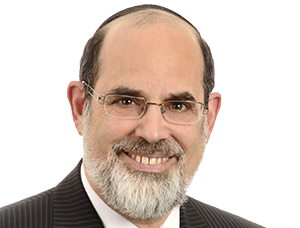Rabbi Avraham Feder, cantor, educator and founding rabbi of Toronto’s Beth Tikvah Synagogue, died in Israel on Feb. 8. He was 87.
He was buried in the Har HaMenuchot cemetery overlooking his beloved Jerusalem.
Recalled as a warm, engaging clergyman who connected with his congregants on a personal level and drove them to new spiritual heights, Rabbi Feder practised what he preached on the importance of aliyah and Zionism when he moved to Israel in 1981. He returned to Beth Tikvah, where he was rabbi emeritus, for High Holidays and lectures until 2013.
“He was our rabbi, teacher and friend and touched the lives of so many people,” wrote Avi Herzl, a former congregant who made aliyah in 2009 and now runs a blog called Toronto to Ra’anana. “He worked on building a community, not just a shul. He pushed his congregants towards spiritual growth, greater halakhic observance, wide-ranging musical experience and Zionism.”
Rabbi Feder “had authenticity,” said Beth Tikvah’s Rabbi Jarrod Grover in a recent Shabbat sermon. “He rejected attempts to water down Judaism and impressed everyone with a sophisticated knowledge of both Jewish and secular sources – blending the two in innovative and fascinating ways.”
He asked his congregants to take their Judaism seriously, Rabbi Grover went on, “to take the rebirth of the Jewish people in the land of Israel seriously, to take family life seriously. And he would get you to rethink your priorities in life without even knowing that you were doing so. Nothing with him was diluted for mass consumption. It led to some challenge and disagreement, but even those who disagreed with him respected him.”
Rabbi Feder was born in New York City in 1930. His father was a cantor who owned a grocery store that went bankrupt after extending credit a bit too freely. Young Avraham would join his parents in singing beautiful harmonies.
He served as a cantor in New York City, Albany, N.Y., and New Haven, Conn., from where he commuted daily to the Jewish Theological Seminary in New York to study for his rabbinic ordination.
He came to Toronto in 1967 with a young family to become rabbi and hazzan at Beth Tikvah, then a nascent Conservative shul in North York, Ont. Membership grew under his tenure, and today has surpassed 1,100 families.
READ: THE PASSING OF YEHUDA GILDEN, TORONTO’S JEWISH MUSIC MAVEN
He created “a singing kehillah (community) that exists to this day,” said his daughter Bracha, a teacher at Associated Hebrew Day Schools.
Often, she recalled, her father crooned Broadway show tunes. Favourites included Somewhere from West Side Story and It Ain’t Necessarily So from Porgy and Bess.
Rabbi Feder was responsible for the opening of the Bayview branch of United Synagogue Day School (now Robbins Hebrew Academy) at Beth Tikvah, “knowing how positive a force that would be” for the synagogue, his daughter added.
He also authored the two-volume Torah Through a Zionist Vision, as well as Tzaki and His Holiday Miracles, stories for children based on his sermons about Tzaki, an 11-year-old Israeli boy.
While serving in the pulpit, he earned a PhD at the Ontario Institute for Studies in Education (OISE) in the philosophy of education, and studied under the famed literary critic Northrop Frye.
“He integrated all that into his teaching of Torah,” his daughter related.
In Israel, he was a whirlwind: a fellow at the Shalom Hartman Institute, a teacher at Bar-Ilan University and of rabbinical and cantorial students at the Schechter Institute, and rabbi at Beit Knesset Moreshet Yisrael, an English-speaking Masorti congregation in Jerusalem. He lectured on Jewish identity to soldiers and volunteered in Jerusalem’s civilian guard.
His first wife, Leona, died in 2004. He is survived by his second wife, Tzipora, three children, two brothers and six grandchildren.
*An incorrect date was given for Rabbi Avraham Feder’s death in the original posting. It has since been corrected.






